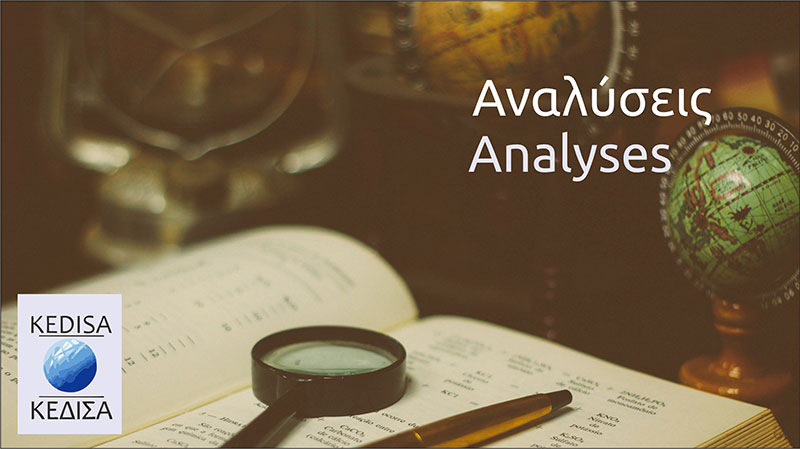By Giovanni Giacalone, Analyst KEDISA
Israel and Turkey seem to be rebuilding ties after the diplomatic crisis that hit the two Middle Eastern countries following the 2008/2009 Israeli operations in Gaza and the Mavi Marmara incident in May 2010.
In December 2015 the two States initiated talks to restore diplomatic ties, but the Israeli support for Kurdish fighters in Syria, disagreements over energy resources in the Eastern Mediterranean and the move of the US embassy from Tel Aviv to Jerusalem in May 2018, with the expulsion of the Israeli ambassador in Turkey, only prevented the achievement of any type of agreement. In a few words, the times when Israeli and Turkish military trained together seem today quite far.
The energy deal in the Eastern Mediterranean
Officially, Israel is a partner in the EastMed pipeline project alongside Egypt, Greece and the Greek Cypriot administration, in contrast to the Turkey-TRNC project, issued in December 2019 between Erdogan and the GNC leader, Fayez al-Serraj, with the objective of spreading Turkish sea hegemony all the way to Libya. An agreement strongly criticized by Egypt, France, Greece, Cyprus, the UAE, and Eastern Libya’s LNA.
An article of the Middle-East Eye indicated how Israel did not sign the statement signed in mid-May by the anti-Ankara coalition, denouncing and condemning Turkish expansionism in the Eastern Mediterranean. The article also pointed out how Israel publicly stated its pride for Israeli-Turkish relations, confirming the membership in the Eastern Med Gas Forum but denying being part of the coalition formed by the countries previously cited, depicting it as related to the Libyan crisis.
Israel’s position on the issue raised questions about what is really going on and Turkish social media rumors about a meeting between Israeli and Turkish officials in order to close a delimitation deal between the two countries, similar to the one closed between Ankara and Tripoli, only contributed to more confusion. However, this story did not find any official confirmation.
The common enemy in Syria
Israel and Turkey have an additional shared interest and that is the fight against Hizbullah in Syria. As a matter of fact, the Iranian proxy is not only Israel’s arch enemy, but it also confronts Turkish troops and jihadist fighters in Syria. Bashar al-Assad and his government forces are in fact contrasted by both Israel and Turkey, as Israeli Airforce raids on Syrian soil have shown on several occasions.
In addition, former Israeli army General Gadi Eisenkot has recently admitted that Israel provided weapons to Syrian rebels in order to help them overthrow Bashar al-Assad’s government.
It is undeniable that the Iranian corridor that runs through Iraq and Syria, all the way to Lebanon, is a threat for Israel’s security and as a consequence the Jewish State is propense to improve its relations with Turkey; a move that is supported by US envoy to Syria, James Jeffrey, who is extremely pro-Turkey and anti-Assad and who has made some embarrassing statements in February, regarding the Syrian branch of al-Qaeda, Hayyat Tahrir al-Sham (former Jabhat al-Nusra), claiming that “it was possible to consider Hayat Tahrir al-Sham not a terrorist organization as such and that it would be possible under certain circumstances to enter into a dialogue with it since the organization hadn’t conducted attacks outside of Syrian borders”.
Recently, Jeffrey welcomed Turkey’s new efforts against HTS in northern Syria: “We hope to see the Turks continue to put pressure on the terrorist organizations there, the most powerful of them Hayat Tahrir al Sham”.
Erdogan might be the real problem to a Turkish-NATO/Israeli deal
The old strategy “the enemy of my enemy is my friend” still seems to be working in this case, but is such a vision appropriate? There are three factors that must be kept well in mind:
- Throughout time, Turkish President Tayyip Erdogan has revealed himself as a very contradicting and unreliable partner, arming jihadists in Syria and at the same time claiming Turkey’s efforts in the fight against Isis in Syria. Cutting deals with Russia over the crisis in northern Syria while supporting jihadists in Idlib and shooting down Russian jets. Receiving money from the EU in order to block the immigrant flow from the Balkanic route while opening the way for immigrants towards Greek territory. Keeping one foot on NATO and one foot on Russia, trying to exploit this contraposition.
- Erdogan’s AKP-ruled government has an obvious Islamist nature and one of Ankara’s projects is to present itself as the paladin of Islamism worldwide, from the Uyghur’s issue to the support for Islamist militias in Libya, with the transfer of Syrian jihadists and mercenaries to back the GNA (which is now nothing more than Ankara’s puppet in Libya). Today’s Turkey is also the new stronghold of the Muslim Brotherhood, together with Qatar; an Islamist extremist organization that has been banned in Egypt, UAE, Bahrein, Saudi Arabia, Syria, Russia, and which ended up under investigation in the United Kingdom. Israel is an arch-enemy of the Muslim Brotherhood and it is not a case that its Palestinian branch, Hamas, is being supported by Turkey, Iran, and Qatar. It would also be useful to carefully examine if Erdogan has any real interest in severing its ties with Iran, especially its most conservative religious arena. Something that the US naively hope for.
- While Turkey is suffering a serious economic crisis, with a devaluation of the Turkish currency and with a general situation that will probably turn worse in the upcoming months due to the Covid crisis, Erdogan and his power-lobby are busy wasting millions on the Libyan scenario, sending military support via sea and air, while Turkish casualties in Syria and Libya keep occurring. In a few words, Erdogan seems far more concerned about his Islamist/Muslim Brotherhood interests rather than about what would really benefit the country. In order to silence dissent, through the years, Erdogan has taken extremely oppressive measures against the media and political opposers, depicting as “terrorist” whoever disagrees with his agenda. Erdogan’s longtime oppressive rule caused more problems than benefits for the country and even the Turkish military establishment, heavily purged by Erdogan after the failed coup attempt in the summer of 2016, is well aware of this.
Turkey’s longstanding alliances with Israel and NATO have been endangered by the new Islamist agenda carried out by Erdogan and the AKP. Turkey’s potential EU membership has been put into serious doubt as Turkish Islamic centers in Austria played some horrifying and embarrassing scenes of child martyrs dressed in Ottoman and martyr outfits while Turkish religious actors carry out aggressive lobbying in the Balkans and Europe to promote the MB version of Islam. As if it wasn’t enough, Turkish military has been constantly provoking Greece to the point of invading its territory, something extremely embarrassing as the two countries are both NATO members.
In conclusion, Erdogan and his AKP agenda might be the real problem and it is not utopic to speculate that Erdogan’s end might come from within the country as Turkish and Muslim Brotherhood divergence of interests keep incrementing.
 English
English

